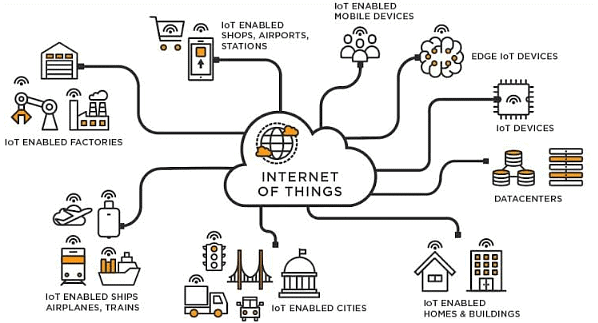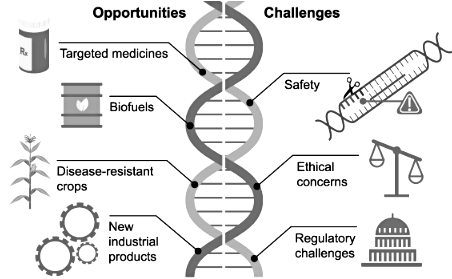UPSC Exam > UPSC Notes > Gist of Rajya Sabha TV / RSTV (now Sansad TV) > Perspective: Disruptive & Futuristic Technologies
Perspective: Disruptive & Futuristic Technologies | Gist of Rajya Sabha TV / RSTV (now Sansad TV) - UPSC PDF Download
Context
Disruptive technology is an innovation that significantly alters the way that consumers, industries, or businesses operate.
Details:
- It displaces a well-established product or technology, creating a new industry or market.
- New technology can either be sustaining or disruptive.
- While sustaining technology depends on the incremental improvements in the already existing technology, disruptive technology is a completely new one.
Introduction:
- In the ever-changing realm of technological progress, transformative advancements play a crucial role in restructuring industries and societal norms. These groundbreaking innovations introduce new approaches, products, or services that challenge established norms and set the stage for a revolution.
Disruptive Technologies: Catalysts of Change:
- Disruptive technologies, as their name implies, act as the driving force behind transformative changes.
- These innovations possess the capability to replace existing solutions, leaving a profound impact on industries, markets, and societal norms.
- Through improved efficiency, reduced costs, or the introduction of novel features, disruptive technologies not only challenge traditional business models but also usher in a new era of possibilities.
Key Characteristics of Disruptive Technologies:
- Efficiency Enhancement: Disruptive technologies frequently bring about enhancements in efficiency, streamlining processes and operations.
- Cost Reduction: A hallmark feature is the ability to lower costs, making these innovations economically appealing and competitive.
- Innovation Challenge: By introducing novel features, disruptive technologies push the boundaries of what is considered standard, fostering continuous innovation.
- Sector Reshaping: The influence of disruptive technologies extends beyond individual businesses, reshaping entire sectors and compelling stakeholders to adapt to the evolving landscape.
Futuristic Technologies:
- Cutting-edge technologies represent the forefront of innovation, often existing in conceptual or developmental stages. These advanced innovations hold the potential to significantly impact various facets of human life and society in the future.
Key Attributes of Futuristic Technologies:
- Ongoing Innovation: Advanced technologies consistently push the boundaries of innovation, undergoing continuous development and improvement.
- Projected Impact: These technologies are anticipated to instigate significant transformations, addressing current challenges and presenting solutions for the future.
- Wide-ranging Applications: From healthcare to transportation, advanced technologies have the capacity to influence diverse sectors, offering progress in various fields.
- Interaction Between Disruptive and Advanced Technologies: The terms disruptive and advanced technologies are often used interchangeably, underscoring the inherent disruptive nature of innovations poised to shape the future.
The perpetual evolution of technology ensures that what is considered advanced today may become disruptive tomorrow, challenging the existing norms and propelling us toward a dynamic and ever-changing future.
Examples:
- Smartphones: Revolutionized traditional mobile phones and various consumer electronics by incorporating multiple functions into a single device.
- Streaming Services: Transformed traditional cable and satellite TV by providing on-demand, subscription-based content delivery over the internet.
- Electric Vehicles: Disrupting the automotive industry by challenging the dominance of internal combustion engines with more sustainable electric alternatives.
- 3D Printing: Overhauling manufacturing processes by facilitating the production of customized, on-demand items with reduced waste.
- Blockchain and Cryptocurrencies: Disrupting traditional financial systems by introducing decentralized and secure methods of digital transactions.
Applications of Disruptive and Futuristic Technologies:
- Accelerated Technological Advancements
The swift evolution of Artificial Intelligence (AI), Machine Learning, and Quantum Computing is fostering innovation across various sectors. The integration of AI with robotics is generating potent and adaptable solutions. - Digital Transformation in Organizations
Organizations are embracing digital transformation, leveraging technologies to streamline operations, enrich customer experiences, and secure a competitive advantage. Crucial elements in this transformation include Cloud computing, edge computing, and the Internet of Things (IoT).
- Remote Work and Collaboration
The COVID-19 pandemic has hastened the acceptance of remote work and virtual collaboration. Key technologies facilitating this shift encompass remote communication tools, video conferencing platforms, and digital collaboration solutions. - Health Tech and Biotechnology Advancements
The healthcare sector is witnessing remarkable progress in telemedicine, personalized medicine, genomics, and bioinformatics. The pandemic has intensified efforts in vaccine development, diagnostic tools, and data-driven healthcare solutions.
- Renewable Energy and Sustainability
The focus on sustainable technologies and renewable energy sources is escalating to address environmental concerns. Innovations in energy storage, smart grids, and electric transportation are contributing to a more sustainable future. - Blockchain and Decentralized Finance (DeFi)
Beyond cryptocurrencies, blockchain technology is evolving. DeFi platforms are revolutionizing traditional finance by offering decentralized alternatives for banking, lending, and trading. - Space Exploration and Commercialization
The space industry is undergoing a resurgence, with heightened interest from both public and private entities. Commercial space travel, satellite constellations, and lunar exploration projects are gaining traction.
Challenges Related to Disruptive & Futuristic Technology:
- Challenges for Developing Countries:
Developing nations, such as India, encounter obstacles like limited human capital, inefficient institutions, and a demanding business environment, starting from a disadvantaged position. - Trust and Ethical Questions:
While the disruptive technology itself is not problematic, ethical dilemmas arise concerning privacy, ownership, and transparency. Addressing these concerns is crucial to avoid potential issues. - Challenges in Adaptability:
Disruptive innovations require time to prove themselves in complex market conditions. Success depends on adaptability to the market environment, and gaining market penetration takes a considerable amount of time. - Untested & Time-Consuming:
New technologies often undergo refining during their early stages, with a significant gestation period before establishing themselves in the market. - Redundancy of Prevalent Old Technology:
Innovative ideas and business models disrupt established ones, leading to fierce competition. Established businesses may take various measures to prevent being ousted from the market, posing a significant challenge for new entrants. - Cybersecurity Challenges:
As technologies advance, the importance of robust cybersecurity measures increases. Growing cyber threats highlight the need for ongoing developments in cybersecurity technologies. - Global Collaboration and Competition:
The development and deployment of disruptive technologies necessitate global collaboration and competition, with countries and companies vying for leadership in key technological domains.
Way Forward:
- Creating an Enabling Environment for Disruptive Technologies:
To fully leverage the potential of the next generation of technology and innovation, a policy framework should prioritize developing an environment that positively impacts the economy, society, and the environment while addressing inequalities. - Embracing a Holistic Approach:
Success in disruptive technologies requires more than just technology; a whole-of-economy or most-of-society approach is crucial. Policymakers should consider local contexts and conditions to establish ecosystems driving inclusive growth. - Promoting Research and Development (R&D) Sector:
Encouraging the establishment of product design centers is crucial for tailoring products to the local environment and consumers, fostering inclusive information and communication technology (ICT) infrastructure. - Government Support for Inclusive Growth:
Governments should play a pivotal role in supporting distributed manufacturing in smaller towns. Additionally, the IT industry should focus on creating seamless platforms and marketplaces connecting consumer demands, product designers, and manufacturers. - International Cooperation for Standard Setting:
As disruptive technologies like AI are evolving globally, international cooperation is essential. Governments need to collaborate on setting standards at the multilateral level to ensure a cohesive and effective approach to technology development and implementation.
Conclusion
The introduction of such technology brings substantial benefits to both consumers and businesses, positively reshaping entire industries. Efficient utilization of this technology has the potential to unlock numerous innovative benefits for consumers and industry producers alike.
The document Perspective: Disruptive & Futuristic Technologies | Gist of Rajya Sabha TV / RSTV (now Sansad TV) - UPSC is a part of the UPSC Course Gist of Rajya Sabha TV / RSTV (now Sansad TV).
All you need of UPSC at this link: UPSC
FAQs on Perspective: Disruptive & Futuristic Technologies - Gist of Rajya Sabha TV / RSTV (now Sansad TV) - UPSC
| 1. What are disruptive technologies? |  |
Ans. Disruptive technologies are innovations that significantly alter the way industries or businesses operate, often leading to the creation of new markets or the disruption of existing ones. These technologies typically offer improved performance, cost-efficiency, or convenience compared to traditional solutions and have the potential to reshape entire industries.
| 2. What are some examples of disruptive technologies? |  |
Ans. Some examples of disruptive technologies include artificial intelligence (AI), blockchain, 3D printing, virtual reality (VR), and the Internet of Things (IoT). These technologies have the potential to revolutionize various sectors such as healthcare, manufacturing, finance, and transportation by introducing new ways of doing things and transforming business models.
| 3. What is the significance of disruptive technologies in the context of UPSC? |  |
Ans. Understanding disruptive technologies is crucial for UPSC aspirants as it enables them to comprehend the ongoing technological advancements and their impact on society, economy, and governance. Questions related to disruptive technologies may appear in UPSC exams to assess the candidates' awareness of emerging trends, their implications, and the potential challenges and opportunities they present.
| 4. How can disruptive technologies shape the future? |  |
Ans. Disruptive technologies have the potential to shape the future by enabling new possibilities, transforming industries, and addressing societal challenges. For example, AI can revolutionize healthcare by improving diagnosis and treatment, while 3D printing can revolutionize manufacturing by allowing customized production and reducing waste. These technologies can lead to increased efficiency, economic growth, and improved quality of life.
| 5. What are the key challenges associated with disruptive technologies? |  |
Ans. Disruptive technologies bring about various challenges that need to be addressed. Some of the key challenges include ethical concerns related to AI and automation, job displacement due to technological advancements, data privacy and security risks, and the need for regulatory frameworks to ensure responsible and equitable use of these technologies. Additionally, the rapid pace of technological change may create a digital divide between those who can adapt and those who cannot, exacerbating existing social and economic inequalities.
Related Searches





















